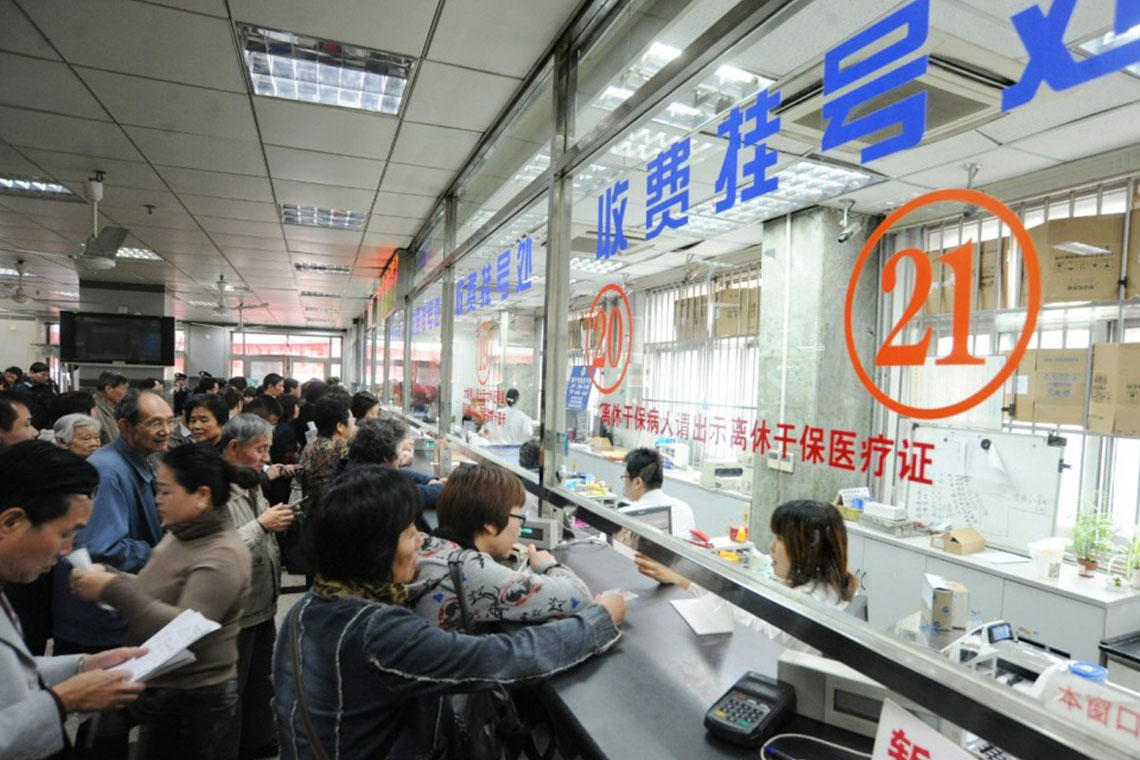Cheap drugs and grisly murders
Top China news for March 23, 2017. Get this daily digest delivered to your inbox by signing up at supchina.com/subscribe.

Ambitious reforms for Beijing hospitals
The Beijing city government issued a set of regulations on Wednesday to govern the way hospitals in the city charge for drugs and services. The rules take effect on April 8, 2017, and are intended to address one of the Chinese healthcare system’s worst problems: overprescribing and overcharging for drugs. Hospitals and doctors do this because they are underfunded, and the easiest way to make money is to generate profit from expensive medicines.
Covering more than 3,600 public medical institutions in the capital, the new scheme mandates greater transparency in drug procurement, and prohibits markups on drugs, which currently add 15 to 20 percent to their prices. In order to make up some of the shortfall, according to the Beijing News (in Chinese), hospitals will levy service fees for all consultations, ranging from 20 to 100 yuan depending on the type of hospital. Surgery and specialized treatments will also be more expensive, with the exception of CT, MRI, and PET scans. The plan is intended to keep healthcare costs at their current levels, but the Beijing government will probably have to increase funding for hospitals to ensure that they remain solvent.
If the plan proves successful, it will end one of the worst abuses of the Chinese healthcare system and is likely to be replicated nationwide.
Gangs who kill workers to claim compensation
Caixin has a feature story on the recent trial of perpetrators of a truly horrible type of crime that has become all too common in China. In 2014, a construction worker in Beijing was hit on the head with a steel bar and thrown off the 13th floor of a building by two of his co-workers. The murderers claimed to be his relatives — he was from a village in rural Shaanxi Province — and demanded compensation from the construction company. The site supervisor had no identification from the dead worker, which allowed the criminals to plausibly claim that they were his relatives. However, during negotiations with the company about the amount of compensation, their behavior aroused suspicion, and the company called in the police. The two men have been convicted of premeditated murder. Last year, Caixin published a story about a similar scam involving a gang that murdered at least 17 coal miners between 2009 and 2014.
—Jeremy Goldkorn, Editor in Chief
All-Star Sinica Podcast
Today on The China Project, we release a podcast recorded before a live audience in San Francisco in which Kaiser interviews MIT professor Yasheng Huang, author John Pomfret, and economist Andy Rothman. The discussion’s timely topic: What lies ahead in politics, trade, and bilateral China-U.S. relations in the age of Trump.
North Korea and Rex Tillerson’s muddled arguments in Beijing
Today we also publish an opinion piece by Matthew Stinson on the lack of clarity in the U.S. Secretary of State’s comments on North Korea during his recent visit to China.
This issue of the The China Project newsletter was produced by Sky Canaves, Lucas Niewenhuis, Jia Guo, and Jiayun Feng. More China stories worth your time are curated below, with the most important ones at the top of each section.
BUSINESS AND TECHNOLOGY:
Big airlines and big oil
Bloomberg reports that American Airlines, the world’s biggest carrier, is in talks to invest about $200 million in China Southern Airlines. The article calls this sum of money “a bagatelle” compared with the more than $40 billion of revenue that American Airlines brought in over the last year. But as Chinese tourists venture abroad in greater numbers, often bearing the 10-year U.S. visas that have been available to them since 2016, American Airlines is missing out because it has very few landing slots at Chinese airports. Buying into China Southern could pave the way for a code-share agreement that would allow American Airlines to buy seats on the Chinese airline’s aircraft and “offer ‘virtual’ capacity instead.”
In a deal with a bigger price tag, Chevron is going to sell shares of its assets in South Africa and Botswana to the Chinese energy giant Sinopec for $900 million. Caixin reports that the agreement will give Sinopec 75 percent of the shares of Chevron’s branch in South Africa and 100 percent shares in the Botswana subsidiary. It will also allow the Chinese company to rebrand Chevron’s 820 Caltex gas stations in the two countries with the Sinopec name, as well as take over a refinery and lubricating-oil plant and other facilities.
- China bets on sensitive U.S. startups, worrying the Pentagon / NYT (paywall)
- China tells cornerstones to bring money home in blow for smaller HK IPOs: sources / Reuters
- Frozen beef stranded at sea as China shuts out Brazil’s meat / Bloomberg
- Global box office barely grew in 2016. Blame it on China / LA Times
- Cartier talks about cracking China with WeChat / Financial Times (paywall)
POLITICS AND CURRENT AFFAIRS:
China draws Canada, Hong Kong into regional bank
The U.S. endured a major diplomatic embarrassment two years ago with a failed effort to convince allies not to join China’s Asian Infrastructure Investment Bank (AIIB). Since then, China has continued to draw an increasing number of countries around the world into its new financial projects. The Canadian newspaper Globe and Mail, reporting positively on the admission on Thursday of Canada to the bank, noted that the U.S. and Japan stood out as the only two G7 countries still refusing to participate. Canada membership, for a capital subscription of nearly $1 billion, will have a 1 percent stake in the bank, roughly equivalent to that of Israel, Switzerland, and Poland.
Hong Kong also became a new member of the AIIB as part of a group of 13 countries and territories, including Afghanistan, Ireland, and Ethiopia. The South China Morning Post says that Hong Kong’s government intends to seek approval from LegCo, the territory’s Legislative Council, for HK$1.2 billion ($150 million) next month to be paid to the AIIB over five years, for a stake of about 0.7 percent.
- Chinese premier warns Australia ‘taking sides’ could lead to new cold war / The Guardian – Li Keqiang is visiting Australia through Sunday
- Military parade in capital marks Pakistan Day celebrations / Geo News – Chinese troops participated
- China on high alert for Japan’s military move / Xinhua
- Beijing attempts ambitious reform of hospital costs / Caixin
- Little choice for Hong Kong as China controls leadership race / Financial Times (paywall)
- Why is Spain in the middle of a spat between China and Taiwan? / BBC News
- China to ‘inspect’ lawyer after torture allegations / The Globe and Mail
- A court in China wrote a poignant verdict on the killing of a reporter who covered domestic violence – by her husband / Quartz
SOCIETY AND CULTURE:
China defeats South Korea in World Cup qualifier
China beat South Korea 1-0 at a World Cup qualifier in Changsha, Hunan Province, on Thursday, keeping the team’s 2018 soccer World Cup dream alive. The game was played in the midst of high tensions between the two countries, which began after the U.S. deployed its THAAD missile defense system in South Korea earlier this month. China, believing that this move threatens its national security, responded to the deployment by targeting South Korean businesses and the country’s tourism industry. In recent years, anti-Korean sentiment has periodically riled up Chinese citizens, occasionally leading to violence at soccer matches. At Thursday’s game, there were more than 37,000 spectators, including about 100 South Korean fans, who were surrounded by just as many police.
On the social network Weibo, the victory stirred up nationalistic feelings. One commenter said (in Chinese), “In this sensitive time of THAAD, China and South Korea had a football war. The Chinese national team is awesome! You’re our nation’s pride…China is the best!” Another commenter said (in Chinese), “This is not magic! This is not magic! This is a victory made by the sweat and effort of the Chinese team.”
- Demolishing Dalian: China’s ‘Russian’ city is erasing its heritage – in pictures / The Guardian
- Welcome to Yiwu: China’s testing ground for a multicultural city / The Guardian
- China writers remember Robert Silvers / ChinaFile
- Million-dollar holiday snaps? Andy Warhol’s China photographs up for auction / CNN
- New plant species discovered in Tibet / China Daily





